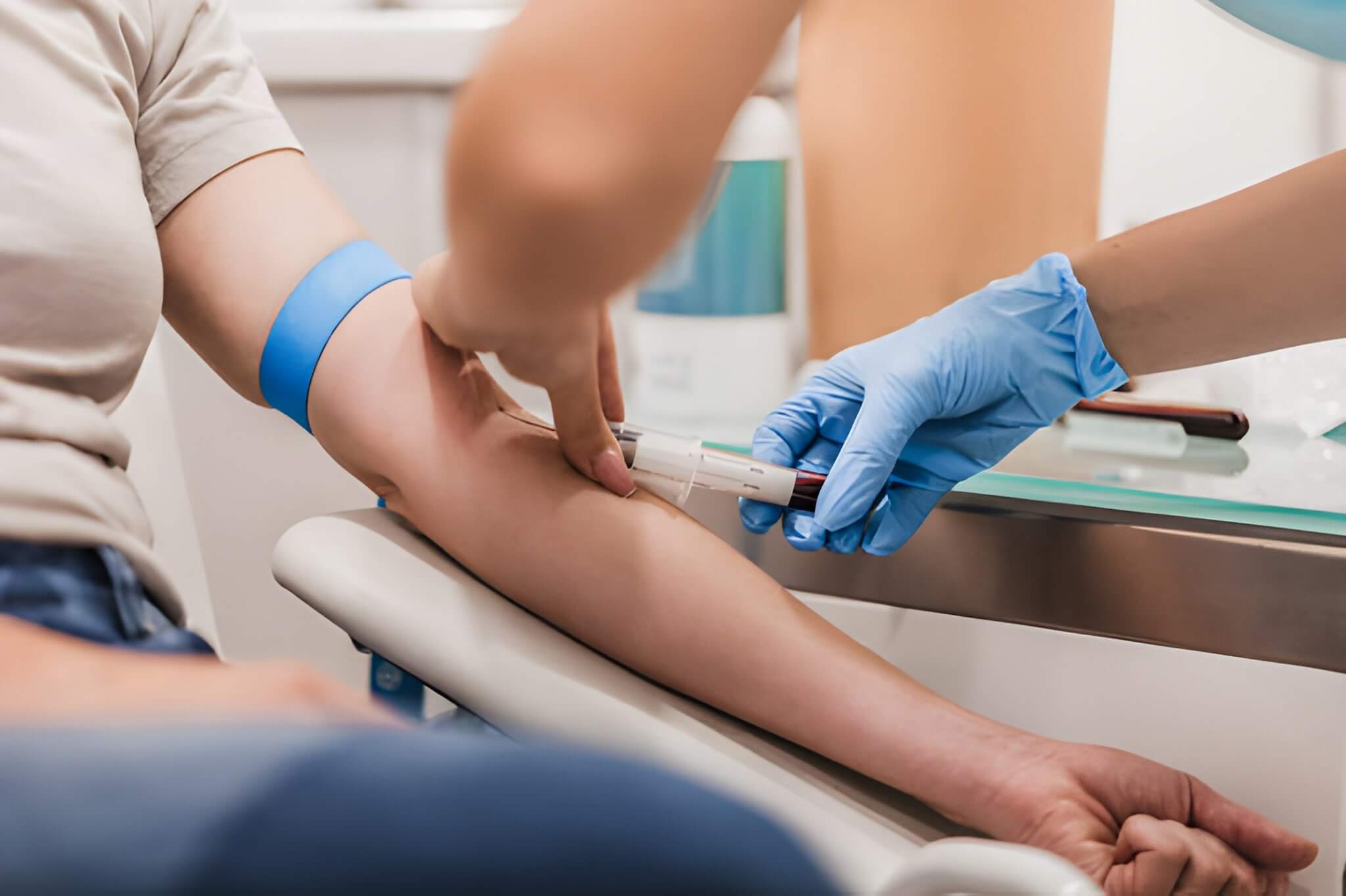When patients visit my clinic in Hartford for their annual checkup, one of the most common questions I hear is: “Do normal blood tests show STDs?” It’s a great question — and one that often causes confusion. Many people assume that when their bloodwork comes back “normal,” it means they’re free of sexually transmitted diseases (STDs). Unfortunately, that’s not always true.
As a Board-Certified Nurse Practitioner (Meghan Killilea Galli, APRN, FNP-BC), I’ll explain what standard blood tests include, which specific infections can show up in blood work, and when specialized STD testing is necessary.
Understanding What “Normal Blood Tests” Mean
A normal blood test (such as a complete blood count or metabolic panel) checks for general health markers — not infections like chlamydia or gonorrhea. These tests measure things like:
-
Red and white blood cell counts
-
Blood sugar levels
-
Kidney and liver function
-
Electrolytes and cholesterol
So, if you get your routine blood work done during an annual exam, it won’t automatically test for STDs unless your provider specifically orders those panels.
Can Blood Work Detect STDs?
The short answer: Yes, but only certain STDs are detected through blood tests.
Some infections cause antibodies or proteins to appear in your bloodstream — and that’s what we can identify through testing. However, others require urine tests, swabs, or specific cultures instead.
Here’s a breakdown of which STDs can be detected through blood work and which cannot:
STDs That Can Show Up in Blood Work
-
HIV (Human Immunodeficiency Virus)
-
Blood tests detect HIV antibodies or antigens in your system.
-
Modern tests can identify HIV as early as 2–4 weeks after exposure.
-
-
Syphilis
-
Caused by Treponema pallidum, syphilis is identified through antibody testing.
-
These blood tests can confirm both current and past infections.
-
-
Hepatitis B and C
-
Both viruses affect the liver and are easily detected through specific blood panels.
-
These tests look for antibodies and viral proteins to determine if you’re infected or immune.
-
-
Herpes (HSV-1 and HSV-2)
-
Blood tests can detect herpes antibodies, showing whether you’ve been exposed.
-
However, they can’t always tell if an infection is active or when exposure occurred.
-
STDs That Do Not Show Up in Blood Work
Some of the most common STDs don’t appear in standard blood tests because they don’t affect your bloodstream directly. These require swab or urine testing instead.
-
Chlamydia – Detected through urine or genital swab
-
Gonorrhea – Detected through urine or swab samples
-
Trichomoniasis – Usually identified through vaginal swabs or microscopic examination
-
HPV (Human Papillomavirus) – Detected through Pap smears, not blood tests
So if you only had a routine blood test, you might still need targeted STD testing to be sure.
Would STDs Show in Blood Work If I Had an Infection?
If your provider doesn’t specifically order STD panels, your blood work may look completely normal even if you’re infected.
That’s because:
-
Routine blood tests don’t screen for sexually transmitted infections.
-
Some STDs stay localized (like in the genitals or throat).
-
You might not have symptoms even when infected.
That’s why STD testing needs to be intentional — not assumed as part of routine labs.
Symptoms That May Warrant STD Testing
If you’re unsure whether you need testing, watch for common signs such as:
-
Burning sensation while urinating
-
Unusual vaginal or penile discharge
-
Pelvic or lower abdominal pain
-
Sores, blisters, or rashes near the genitals or mouth
-
Itching or irritation
-
Flu-like symptoms (especially with HIV or Hepatitis)
However, keep in mind that many STDs are asymptomatic, meaning they show no signs at all — especially in early stages.
If you’re sexually active or have a new partner, it’s best to get regular STD screening, even if you feel fine.
Why You Should Ask for STD Testing Separately
When patients ask, “Does blood work show STDs?”, I always clarify that routine panels and STD screenings are different.
Here’s why separate testing matters:
-
Prevention: Early detection prevents long-term complications like infertility or chronic pain.
-
Peace of mind: Knowing your status helps protect you and your partner.
-
Treatment: Many STDs are curable with antibiotics or antiviral medication.
When scheduling labs, simply ask your provider to include “STD screening” or “STI panel” in your orders.
How STD Testing Works
Depending on your sexual history and symptoms, your provider may recommend one or more of the following tests:
-
Blood tests for HIV, syphilis, hepatitis, and herpes
-
Urine tests for chlamydia and gonorrhea
-
Swabs from the genitals, throat, or rectum if needed
Testing is quick, confidential, and typically covered by insurance, including Medicare and Medicaid.
How Often Should You Get Tested for STDs?
The Centers for Disease Control and Prevention (CDC) recommends:
-
Annually: For sexually active individuals under 25, or those with new/multiple partners
-
Every 3–6 months: If you have higher risk factors (e.g., unprotected sex, multiple partners)
-
Once in a lifetime: For hepatitis B, C, and HIV screening if you’ve never been tested
If you’re unsure, talk with your healthcare provider — they’ll personalize a screening schedule based on your health history.
What to Do If You Test Positive
Finding out you have an STD can feel overwhelming, but remember: you’re not alone, and most infections are treatable.
Here’s what typically happens:
-
Your provider discusses the results and explains the next steps.
-
Treatment begins promptly, often with oral medication or injections.
-
Your partner(s) may need testing to prevent reinfection.
-
Follow-up testing confirms that the infection is fully resolved.
Early detection is key — the sooner you’re diagnosed, the easier treatment usually is.
Final Thoughts
So, do normal blood tests show STDs? The honest answer is: not usually.
While some infections like HIV, syphilis, hepatitis, and herpes can be found through blood work, others like chlamydia, gonorrhea, and HPV require separate tests.
If you’ve had unprotected sex, new partners, or just want peace of mind, talk to your provider about a full STD screening — not just standard blood work.
As a Hartford-based Family Nurse Practitioner, I encourage every patient to take charge of their sexual health through open communication and regular testing. It’s one of the simplest, smartest ways to protect both your health and your relationships.
Disclaimer: This is informational content, not a substitute for professional medical advice.

Meghan Killilea Galli, APRN, FNP-BC, is a board-certified Family Nurse Practitioner based in Connecticut with over 5 years of clinical experience in urology, women’s pelvic health, and primary care. She currently practices with Hartford HealthCare and Griffin Faculty Practice Plan, where she provides evidence-based, patient-centered care. Meghan founded Health Gardeners to make reliable health information accessible for Hartford residents and beyond. Read More ![]()

